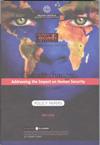The Hellenic Ministry of Foreign Affairs (MFA) in the context of Greece’s presidency of the Human Security Network for 2007/8 took the initiative to appoint ELIAMEP in coordinating the development of four policy studies with regard to climate change effects in vulnerable groups.
The MFA together with ELIAMEP decided on the development of four separate studies regarding the climate change effects in women, children and environmentally forced migrants in developing regions as well as an overall study about the global cooperating strategies for the confrontation of climate change effects in vulnerable groups. In October 2007, the scientific partners to undertake the four separate studies were appointed after a detailed contact with candidate organizations.The studies have been already assigned to the following highly accredited organizations :
A. The Institute for Environment and Human Security of the United Nations University (UNU-EHS) located in Bonn (Germany) has undertaken the study of climate change effects and human security at volatile regions with specific reference to environmentally forced migration. The UNU-EHS is considered as one of the most distinctive research organisation for impact analyses on natural or human induced disasters with particular emphasis on developing regions. The case of Egypt and Mozambique will be examined for potential drought and flood intensifications respectively. Also, the case of Vietnam will be investigated in SE Asia.
B. The Women’s Environment and Development Organization (WEDO) settled in New York (U.S), is commissioned to develop a policy paper regarding the climate change effects and human security at volatile regions with specific reference to gender equality and women. The WEDO organisation has a long – standing experience in the analysis of socioeconomic and environmental parameters which promote the gender inequality. Also, WEDO has a an extensive network of non-governmental organisations and research centres in developing regions. The case studies adopted by WEDO will be the countries of Ghana, Senegal and Bangladesh correspondingly.
C. The Innocenti Research Center of UNICEF based in Florence (Italy) will also elaborate a study about the climate change effects in children and broadly in childhood with particular emphasis to the Least Developed Countries (LCDs). The Innocenti consists the research branch of the UNICEF with deep experience in the management of human and natural disasters in regard to childhood. The case studies to be adopted, are Southern Sudan, Morocco, Mozambique and field studies in SE Asia from the recent tsunami event.
D. Finally the Climate Change Research Group (CCRG) of the International Institute for Environment and Development (IIED) undertook the development of a study about the international cooperating strategies required for the confrontation of climate change effects in global level. The CCRG has participated in the co-authoring of the 3rd and 4th Assessment Report on Intergovernmental Panel on Climate Change (2007) and in other relevant researches on climate change.
The methodological framework of each study will have particular characteristics due to the specific elements of the analyses and the scientific approaches followed by the partners. However, a common agreement from all the project partners was conducted for the reference to the following thematic issues:
- Adaptation of the analysis to 4th Assessment IPCC scenarios
- Approaching of security in childhood, women and migration through a multidimensional prism (food, sanitation, societal degradation etc.)
- Correlation about economic development and climate change effects with reference to the case studies
- Usage of quantitative models for the demonstration of the effects
- Capability of socioeconomic estimation of the climate change effects in the cases selected
- Provision of tangible recommendations for the Hellenic Aid and broadly aid mechanisms
The findings of the studies are anticipated to provide institutional measures for the empowerment of administrative bodies, socio-economic tools for the enhancement of market driven approaches in small scaling level, promotion of funding mechanisms aiming at alleviating poverty and strengthening the information and assessments mainly for low income citizens.
The ELIAMEP will receive the final studies until 15th April 2008 for the editing and binding of an integrated policy paper which will be presented in a major Conference held in Athens within the annual meeting of Human Security Network in May 2008. The policy paper will be presented to highly ranked officers, experts, NGO representatives and other relevant stakeholders as a useful guideline for the aiding of vulnerable groups with the appropriate instruments and measures.
The project is funded by the Greek Ministry of Foreign Affairs
Duration: 1 October 2007 – 31 June 2008
Project Coordinator: ELIAMEP, Dr. Thanos Dokos, Director
Contact
Dr. Thanos Dokos, Director, ELIAMEP
Dr. Xenarios Stefanos, Research Fellow, ELIAMEP



